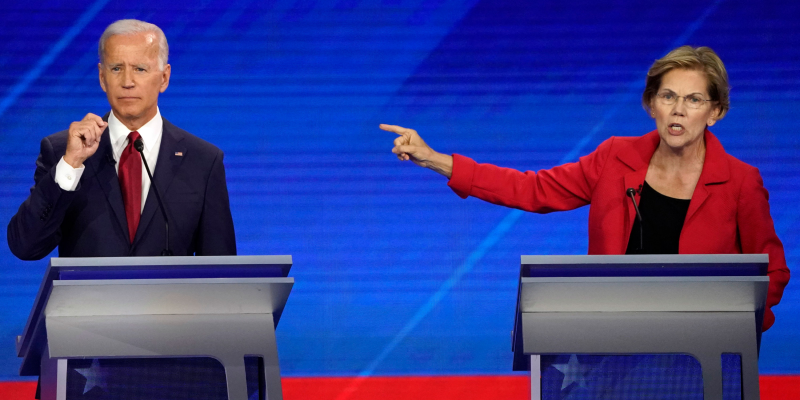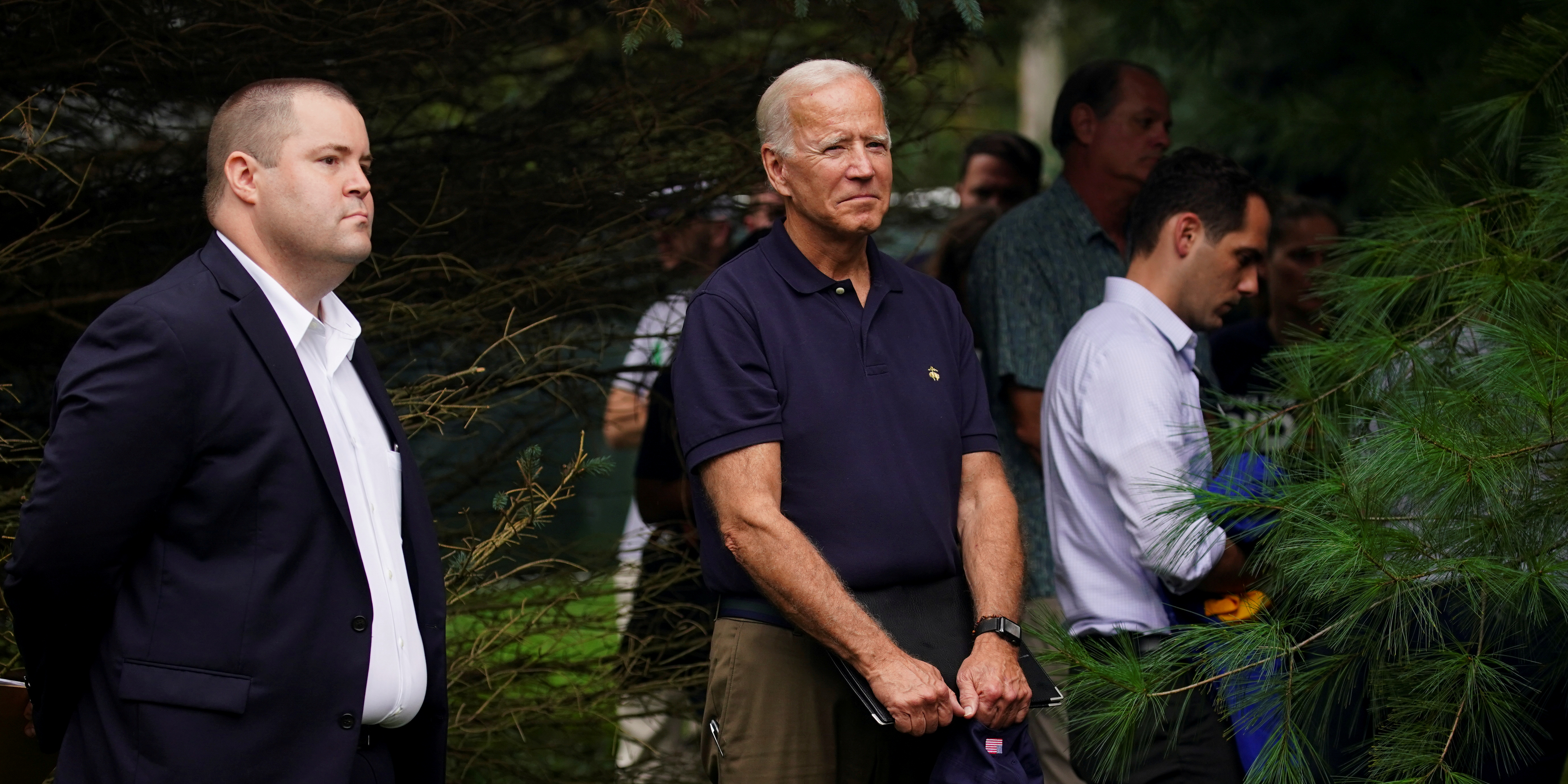- Former Vice President Joe Biden’s five-month run as the definitive frontrunner of the 2020 Democratic primary is coming to an end for three big reasons.
- To help make sense of where all the 2020 Democratic candidates stand, Insider has been conducting a recurring SurveyMonkey Audience national poll since December 2018.
- Biden is experiencing a big problem: The more voters see of him, the less they like him. And the more they see of his main rival, Sen. Elizabeth Warren of Massachusetts, the more they like her.
- The percentage of Democrats satisfied with Biden as the nominee has fallen by nearly 14 percentage points since December in Insider polling, and his doubters have doubled.
- The proportion of Biden supporters who would be satisfied with Warren as the nominee has increased 18 percentage points from 40% in April-May to 58% in August-September.
- And while Biden is still perceived as the most likely to beat Trump, he’s on track to lose his status as the most electable candidate in Insider polling to Warren.
- Visit Business Insider’s homepage for more stories.
With four months to go before the Iowa caucuses, former Vice President Joe Biden’s five-month run as the definitive frontrunner of the 2020 Democratic primary is coming to an end.
Biden came into the race with a lot of advantages from his eight years of serving as the vice president to the still beloved by Democrats former US President Barack Obama, his sky-high name recognition, and his relatively high favorability.
But in both Insider polling and other polls, Biden is experiencing the same huge problem: The more voters see of him, the less they like him. And the more they see of his main rival, Sen. Elizabeth Warren of Massachusetts, the more they like her.
To help make sense of where all the 2020 Democratic candidates stand, Insider has been conducting a recurring SurveyMonkey Audience national poll since December 2018. You can download every poll here, down to the individual respondent data.
Read more about how the Insider 2020 Democratic primary tracker works.
At this point in the race, we're mainly interested in using our polling to figure out:
- What percentage of Democratic voters are familiar with each candidate in the first place.
- How Democrats rate each candidate's chances of beating President Donald Trump in the general election.
- If a given candidate were to drop out of the race, who that candidate's supporters would flock to next.
Read more: Warren is polling better than Biden and starting to look like a 2020 Democratic frontrunner
In addition to Biden's poor performance in Insider polling, other recent polls have showed him losing ground to Warren both nationally and in two key early primary states.
Biden's lead in the RCP average trimmed to its lowest level since he entered the race as he leads Warren now by 6.3 points pic.twitter.com/32uwsV1LHz
— Allan Smith (@akarl_smith) October 1, 2019
A Des Moines Register/CNN poll released on September 21 placed Warren at 22% and Biden at 20% in the state, with Sen. Bernie Sanders in a distant third at 11%.
A few days later, a Monmouth University poll of New Hampshire also found Warren leading Biden with 27% support compared to 25% for Biden and 12% for Sanders. And a national Quinnipiac University poll conducted from September 19 to 23 also placed Warren at 27% and Biden at 25%.
While Warren's lead over Biden was within the margin of the error in all three polls, they mark the first time Warren has overtaken Biden in mainstream telephone surveys from top-tier pollsters, a highly notable development.
Biden still has a big advantage in the key early state of South Carolina because of his strong support among African-American voters, and also still leads in Nevada. But the overall trends from the past few months spell trouble for Biden.
The percentage of Democrats satisfied with Biden as the nominee has fallen by nearly 14 percentage points since December, and his doubters have doubled
When Insider began polling the Democratic primary field in late December 2018, 69% of likely Democratic primary voters said they would be satisfied with Biden as the nominee.
But as he entered the race and became more visible on the campaign trail, Biden's satisfaction has steadily declined since.
In our most recent poll, released on September 25, 55.7% of Democratic voters who would be satisfied with him as the nominee, a 14-percentage-point drop since December 2018 and a 5-percentage-point decrease since April 26 when Biden formally jumped into the race.
In that same timeframe, the percentage of Democratic primary voters who would be satisfied with Warren as the nominee has increased by 20 percentage points from 45.3% in December of 2018, when she announced her presidential exploratory committee, to 65.3% on September 25, 2019.
Not only have Biden's support and satisfaction levels declined, but the proportion of Democratic voters who would be actively unsatisfied with Biden as the nominee has more than doubled from 12% on December 21, 2018 to 26% on September 25, 2019.
Meanwhile, the percentage of Democratic primary voters who would be dissatisfied with Warren as the nominee has slightly decreased from 19% in December 2018 to 15% in our most recent September 25 poll.

Biden's supporters are warming up to other candidates, especially Warren
Insider has been tracking the percentage of every 2020 Democrat's supporters who would be satisfied with other candidates since December 2018. We've also been polling how Democratic primary voters rate each candidate's chances of beating Trump since February 2019.
Another troubling data point for Biden is that his supporters have become more open to other candidates - especially his biggest competitor, Warren.
Interestingly, the percentage of Biden supporters who like Sanders hasn't changed very much over the past few months, suggesting that Warren is peeling off more of Biden's base than any other candidate.
The average of five Insider polls from April and May compared to an average of five polls from August and September show that:
- The percentage of Biden supporters who would be satisfied with Warren as the nominee has increased 18 percentage points from 40% in April-May to 58% in August-September.
- The percentage of Biden supporters who like Andrew Yang has increased 12 percentage points from 5% in April-May to 17% in August-September.
- The percentage of Biden supporters who like Mayor Pete Buttigieg has increased 8 percentage points from 27% in April-May to 35% in August-September.
- And the percentage of Biden backers who like Sen. Kamala Harris and former HUD Secretary Julian Castro, both of whom attacked Biden in previous Democratic debates, have both increased by 7 percentage points.
Voters also increasingly believe that Warren can beat Trump
Biden and his team have explicitly been appealing to electability, arguing Biden can put together a diverse coalition of voters from all races and economic backgrounds to beat Trump.
So far, it's been a smart strategy. Other surveys show that the African-American and older voters who make up Biden's base prioritize beating Trump over nominating a candidate who shares most of their policy positions.
At the Iowa state fair in late August, former second lady Jill Biden argued that even if voters don't agree with Biden on policy, they should hold their noses and vote for him anyway.
"Your candidate might be better on healthcare than Joe is, but you have to look at who is going to win this election, and maybe you have to swallow a little bit and say 'I personally like so-and-so better,' but your bottom line has to be that we have to beat Trump," she said.
Read more: Don't buy into the hype that Biden is necessarily the most electable Democrat
While Biden is still perceived as the most likely to beat Trump, he's on track to lose his status as the candidate with the highest perceived electability to Warren - which could seriously jeopardize the support he maintains from being believed to be Democrats' best chance to beat Trump.
In Insider polling, the percentage of Democrats who think Biden could beat Trump has slightly decreased from 70% in February to 65% in late September while the proportion who think he would lose to Trump has jumped from 13% in February to 22% in September.
In the same period, the percentage of Democrats who think Warren could beat Trump has increased by a stunning 29 percentage points from 30% in February to 59% in September.
And the percentage who think she would lose to Trump has fallen by 20 percentage points from 44% in February to 24% in September.
Biden's lead among older African-American voters - particularly non-college-educated black voters - will be very hard for Warren to crack, and still makes him an extremely formidable candidate.
But as he heads into the next few debates and the final sprint before Iowa and New Hampshire, he'll no longer be on the defense as the presumptive nominee fending off other candidates, but will have to fight tooth and nail to come out on top.

